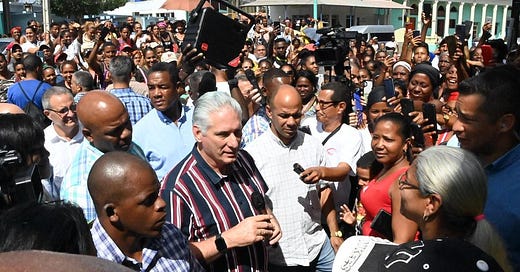In the March 20 inaugural edition of the You-Tube program “Desde La Presidencia,” sponsored by Presidencia Cuba, Cuban President Miguel Díaz-Canel stated that two things happened on March 17, 2024. The first was a group of persons, understandably bothered by long power cuts and by disruptions in the delivery of food in the state-subsidized monthly food basket, went looking for explanations from local authorities. Groups formed in three localities in the eastern provinces of Santiago de Cuba and Bayamo, numbering approximately 1,000 citizens in total in the three places. Explanations were provided by the local authorities, and the majority of persons were satisfied with the explanations, such that normality was soon reestablished.
The second thing that occurred was the construction from these events of a virtual reality, in which sustained protests and rebellions occurred, converting the affair into something more permanent and of greater magnitude. This simulation was con…


